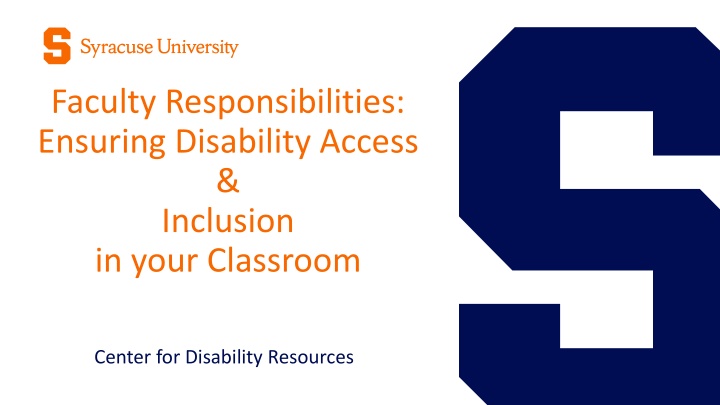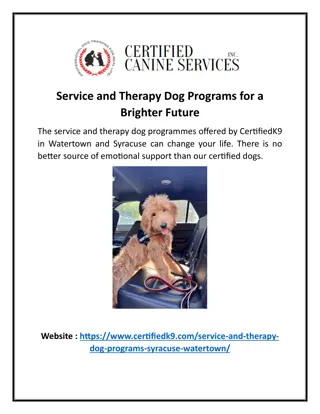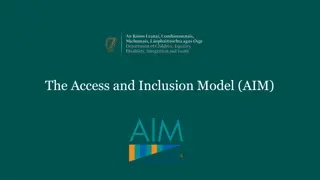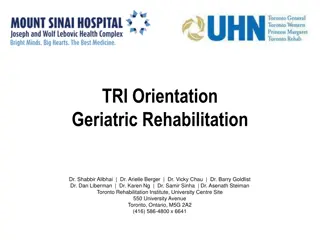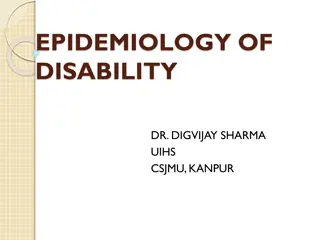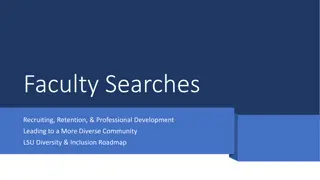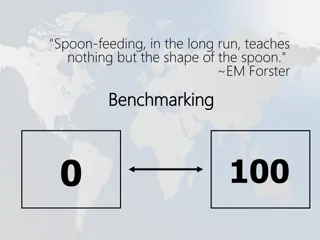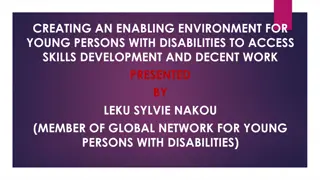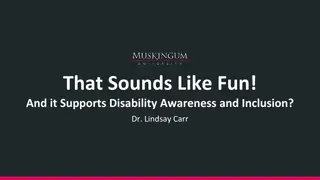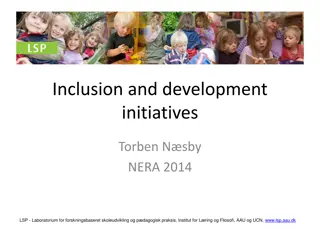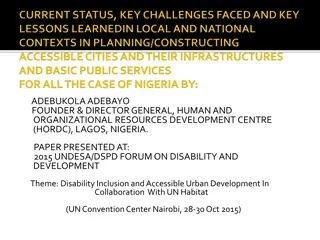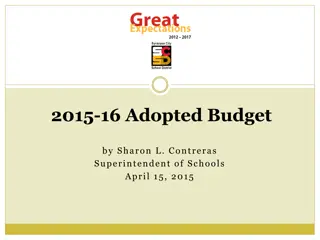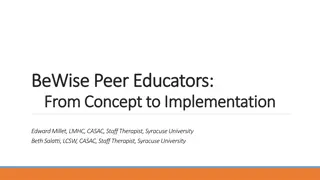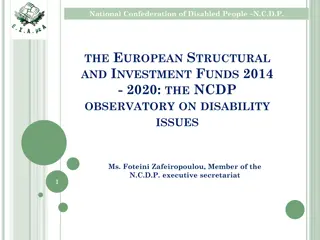Ensuring Disability Access and Inclusion at Syracuse University: Faculty Responsibilities
Syracuse University's Center for Disability Resources (CDR) is dedicated to empowering students, enhancing equity, and promoting innovation and inclusion by supporting faculty in creating universal design and full inclusion in the classroom. The CDR provides individual accommodations and assistive technology to foster independent and self-determined learners, embracing disability as diversity. The mission of the CDR is to redefine the concept of disability and create a culture of inclusivity.
Download Presentation

Please find below an Image/Link to download the presentation.
The content on the website is provided AS IS for your information and personal use only. It may not be sold, licensed, or shared on other websites without obtaining consent from the author.If you encounter any issues during the download, it is possible that the publisher has removed the file from their server.
You are allowed to download the files provided on this website for personal or commercial use, subject to the condition that they are used lawfully. All files are the property of their respective owners.
The content on the website is provided AS IS for your information and personal use only. It may not be sold, licensed, or shared on other websites without obtaining consent from the author.
E N D
Presentation Transcript
Faculty Responsibilities: Ensuring Disability Access & Inclusion in your Classroom Center for Disability Resources
CDR Team Access Coordinators: Portia Altman (SOE & iSchool) Leanne Burrell (Arts & Sciences) Erin Engelhardt (Arts & Sciences) Annette Jenner-Matthews (Law) Christina Papaleo (VPA & Architecture) Kala Rounds (Whitman & UC) Mike Mazzaroppi (Engineering & PC) Additional Staff: Jack Gherardi, Learning Assessment Psychologist Joshua McCleary, Coordinator for Accessible Transportation Jamal Nelson, Administrative Assistant Gabby Perez, Alternative Format & Assistive Technology Specialist Paula Possenti-Perez, Director Bethany Heaton-Crawford, Associate Director (ESF) Judy Kopp, Assistant Director (Falk) Karen Toole, Coordinator Academic Support Elaina Fenstermacher, ADHD/LD Coach Julie Smith, ADHD/LD Coach Donna Trinca, Coordinator of Services Sammie Guisbond, Asst. Coordinator Exam Services Kristofor Minta, Asst. Coordinator Note Taking Michael Grattan, Asst. Coordinator Alternative Format & Assistive Technology Victoria Weber, Administrator for Accommodate Syracuse University 2
Mission The Center for Disability Resources (CDR) mission is to engage the University Community to empower students, enhance equity and provide a platform for innovation and inclusion. We achieve this by mitigating competitive disadvantages and environmental barriers that impact learning; by supporting faculty in the classroom and our colleagues across the university to strive for universal design and full inclusion. We provide individual accommodations when environmental barriers cannot be eliminated and assistive technology that fosters independent, self-determined learners. The Center for Disability Resources embraces the concept of disability as diversity and is committed to creating a new context for disability; to redefine the term disability and the culture that surrounds it! Syracuse University 3
Overall Enrollment Fall 20 University Undergrad CDR % University Grad CDR Grad % Grad School/College Undergrad Undergrad Architecture 596 53 8.9% 92 1 1.1% Art & Sciences 3,256 365 11.2% 809 44 5.4% Education 273 54 19.8% 507 35 6.9% Engineering 1,335 120 9.0% 958 9 0.9% Falk 1,363 263 19.3% 341 15 4.4% iSchool 534 89 16.7% 900 17 1.9% Law 0 0 0.0% 650 91 14.0% Maxwell 1,816 213 11.7% 667 21 3.1% Newhouse 1,583 285 18.0% 435 22 5.1% Whitman 1,825 212 11.6% 1,210 51 4.2% VPA 1,616 250 15.5% 181 8 4.4% University College 282 67 23.8% 93 3 3.2% Total 14,479 1,971 13.6% 6,843 317 4.6% Syracuse University 4
Retention Rates Cohort Year Fall 2016 Outcome Base Year N One Year Later Two Years Later Three Years LaterFour Years Later 3,704 91.4% 86.9% 3,704 0.0% 0.0% 3,704 8.6% 13.1% 322 92.9% 85.7% 322 0.0% 0.0% 322 7.1% 14.3% 3,644 89.5% 84.5% 3,644 0.0% 0.0% 3,644 10.5% 15.5% 403 88.6% 82.6% 403 0.0% 0.0% 403 11.4% 17.4% 3,595 91.7% 84.8% 3,595 0.0% 0.0% 3,595 8.3% 15.2% 397 90.2% 84.4% 397 0.0% 0.0% 397 9.8% 15.6% 3,641 88.5% 3,641 0.0% 3,641 11.5% 424 88.2% 424 0.0% 424 11.8% Annual Retention Rate Cumulative Grad Rate Not Enrolled Rate CDR Annual Retention Rate CDR Cumulative Grad Rate CDR Not Enrolled Rate Annual Retention Rate Cumulative Grad Rate Not Enrolled Rate CDR Annual Retention Rate CDR Cumulative Grad Rate CDR Not Enrolled Rate Annual Retention Rate Cumulative Grad Rate Not Enrolled Rate CDR Annual Retention Rate CDR Cumulative Grad Rate CDR Not Enrolled Rate Annual Retention Rate Cumulative Grad Rate Not Enrolled Rate CDR Annual Retention Rate CDR Cumulative Grad Rate CDR Not Enrolled Rate 82.8% 2.5% 15.0% 81.4% 1.2% 17.4% 79.2% 2.6% 17.2% 78.7% 1.2% 20.1% 7.9% 75.2% 16.9% 6.2% 73.0% 20.8% Fall 2017 Fall 2018 Fall 2019 Syracuse University 5
Legal Context, Implications & Obligations Syracuse University is subject to Section 504 of the Rehabilitation Act and Title III of the ADA The university has mandatory obligations to protect individuals with disabilities including: Students Faculty and staff Visitors Mandate to Higher Education: Provide equally effective access to programs, benefits and services for qualified individuals with disabilities in the most integrated manner possible. 34 CFR 104 & 28 CFR 36 Equally effective access involves developing and providing academic adjustments and auxiliary aids & services. The legal term academic adjustments and auxiliary aids refer to the testing and classroom accommodations approved by CDR and detailed on the students accommodation letter Faculty are not permitted to deny or significantly change an accommodation, unless it s a fundamental alteration of the curriculum Syracuse University 7
Faculty - Points to Consider CDR must entertain requests for accommodations at any time. This is especially important, because sometimes faculty will wonder why a certain accommodation request is being made during the semester as opposed to the very beginning. Students are not required to meet with their Access Coordinator each semester; however, if they decide to request additional accommodations not previously approved, they need to re-engage in the interactive process with CDR. Accommodations are not conditional based on availability, faculty compliance/agreement or administrative burden, *unless they are considered to be a fundamental alteration of the curriculum or to be an undue burden. Fundamental alteration is a change that is so significant that it alters the essential nature of the course or program of study. Faculty should refer to the essential components of their course/curriculum in terms of learning outcomes and to determine if an accommodation would be considered a fundamental alteration. This needs to be consistently applied and supported as being essential across faculty within a discipline. Syracuse University 8
Denying an Accommodation Based on Fundamental Alteration Deference is earned through an adherence to a diligent consideration of the request and alternative means to achieving the fundamental program objective, resulting in a rationally justifiable conclusion (AHEAD 2020, Wynne v. Tufts University; Guckenberger v. Boston University; Zukle v. Regents of Univ. of Cal.; Wong v. Regents of Univ. of Cal.; and more See also, Southeastern v. Davis) The process should involve more than one faculty member or department chair Consultation with peers in similar programs Relevant licensing agencies and or professional (industry) standards Consideration of alternative accommodations, if the original request is not possible. Syracuse University 9
Required Syllabus Statement Taken from The University Senate. Syllabus Statement Regarding Disability-Related Academic Adjustments (required): Syracuse University values diversity and inclusion; we are committed to a climate of mutual respect and full participation. There may be aspects of the instruction or design of this course that result in barriers to your inclusion and full participation in this course. I invite any student to meet with me to discuss strategies and/or accommodations (academic adjustments) that may be essential to your success and to collaborate with the Center for Disability Resources (CDR) in this process. If you would like to discuss disability-accommodations or register with CDR, please visit their website at https://disabilityresources.syr.edu. Please call (315) 443-4498 or email disabilityresources@syr.edu for more detailed information. CDR is responsible for coordinating disability-related academic accommodations and will work with the student to develop an access plan. Since academic accommodations may require early planning and generally are not provided retroactively, please contact CDR as soon as possible to begin this process. Syracuse University 10
Faculty Role & Responsibilities in Ensuring Disability Access & Inclusion
Faculty Role Referral to CDR: disabilityresources.syr.edu/students Faculty play an important role in ensuring timely access. This includes: Disability statement on course syllabi Early notification to CDR of textbook selections to ensure materials are accessible Provide exams to CDR if students use our exam services, as well as be available or assign a designee for student questions during exams as appropriate Assist CDR in finding a peer note taker when we are unable to find one Provide course materials and exams in accessible format for students with blind, low vision, or print disabilities *CDR provides support to faculty with this to ensure that students have equal access to their course materials and content Syracuse University 12
Disability Faculty Portal Single sign-on access point via MySlice located on the Disability Resources Pagelet When you have a student with a disability in your course, you will receive an email notification directing you to the Disability Faculty Portal. View student's accommodation letter, by course. You are not required to sign these as received, but we encourage it for tracking purposes View & approve CDR testing sign-ups per course Upload exams for testing sign-ups by course View notes from hired peer note takers per course Syracuse University 13
Atypical Accommodations Attendance Modification & Assignment Extensions Attendance Modification - requires a modification to an attendance policy due to the possibility/likelihood of an exacerbation of a disability or a disability-related condition. The standard modification is one additional absence beyond the stated attendance policy without penalty. Assignment Extension - provides extra time for out-of-class assignments due to an exacerbation of a disability or a disability- related condition. The standard modification is a 1-day (24-hour) extension that will apply to a limit of two out-of- class written assignments, and the student will notify the instructor in advance of utilizing the accommodation. Syracuse University 14
Managing Non-Standard Attendance Modification & Assignment Extension Agreements Roles and Responsibilities: Student - Complete request form, attach course syllabi, and engage with Access Coordinator Faculty Provide a framework for the contractual agreement. This includes: Determining the threshold for absences/due date extensions (as it relates to fundamental alteration) Decide on when and how the student communicates Determine timeline on missed work/assignments due Access Coordinator Negotiate with faculty (in the development of the formal agreement), follow back up with the student to ensure it meets their access needs, and then finalize. Syracuse University 15
Sample Technology Statement Use of some note taking apps and the newer version of the Livescribe pen, require students to download a web application and use a phone or laptop s speakers to capture the audio during lectures. If faculty do not permit use of technology during lectures, below is a potential statement to add to course syllabi that does not out students with disabilities: Students who have a particular need to use technology are permitted to do so after speaking with me privately to make that arrangement. We will discuss the parameters of its use. Failure to use technology appropriately to support student learning of this course material may result in loss of permission for its use. Syracuse University 16
CDRs Support for Faculty Assigned Access Coordinator (Liaison) for each School & College Exam Services Facilitating accessibility of course content: alternative format, captioning Facilitating Classroom & Course Modifications (Accommodations) Attendance Assignment Extensions Peer Note Takers Consultation regarding complex accommodation concerns **Joint Programming and/or Workshops Syracuse University 17
Resources for Faculty CDR Website - https://disabilityresources.syr.edu/facultystaff/ Guide for Referring Students Attendance as an Accommodation Guidelines * Captioning Services Exam Services FAQs for Faculty & Staff Understanding the Accommodation Letter/Descriptions Syllabus Statement Follow us on Instagram (@sudisabilityresources) Syracuse University 18
Student Getting Connected It always begins with the student one of the most important pieces of the students transition to college is recognizing that they are the ones who need to seek out support. Keep in mind, many students are reluctant to disclose based on their prior experiences or internalized stigma. This may be particularly true for students with other marginalized identities. Students registered with our Center are held to the same academic and technical standards as all students in their respective program. When students initiate engagement with CDR, they participate in what we call an interactive process to develop a comprehensive access plan. Syracuse University 20
Student - Responsibilities Give timely notice of need Provide documentation* - if deemed necessary to establish disability and the necessity of requested accommodation (nexus) Engage in the interactive process with CDR, faculty & staff as appropriate to address the particular need Ex. Request/renew Letter of Accommodation and make available to each of their faculty members. Follow-up with faculty on attendance modifications or extensions on assignments Sign-up (Using Accommodate) and notify faculty of test accommodation requests Timely notification of concerns regarding the provision and quality of accommodations to CDR Ex. Quality of peer notes, advance access to power points Syracuse University 21
Resources & Services for Students Disability Resource Portal Access their Accommodation Letter Renew Accommodation Letters for subsequent semesters Request supplemental accommodations Make appointments with their access counselor Sign up for exams & more Access Coordinator Development of a comprehensive Access Plan: Liaison between student and faculty Advocacy Transition Counselling Mentor students with faculty conversations Facilitate Referrals Syracuse University 22
Additional Resources/Referrals for Students Academic Support Learning Strategist (PT) Professional Tutors Sponsorship for Peer Tutors (CLASS) Assistive Technology Training and Loan Program Access Cuse Accessible Transportation Learning Assessment LD Screenings & evaluations Delta Alpha Pi International Honor Society (DAPi): Delta Gamma Workforce Recruitment Program (WRP) Syracuse University 23
Contact Information & Relevant Emails 804 University Avenue Suite 303 Syracuse, NY 13244 CDR Leadership Team Paula Possenti-Perez, Director ppossent@syr.edu Bethany Heaton Crawford, Associate Director bbheaton@syr.edu Judy Kopp, Assistant Director jkopp@syr.edu Phone: Voice (315) 443-44498 TDD: (315) 443-1371 Fax: (315) 443-1312 disabilityresources@syr.edu cdraccommodate@syr.edu cdrexams@syr.edu Syracuse University 24
The Center for Disability Resources
